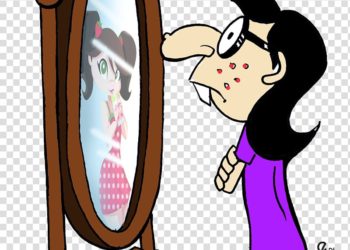The Red Dragon by Thomas Harris is the first book in the Hannibal trilogy. It follows the investigations into the killings committed by a very meticulous serial killer: The Red Dragon. Filled with piquant metaphors, unforgettable characters, and seamless storytelling, the Red Dragon is a book that stays with you long after you have read it. Harris’s greatest feat is creating a villain we hate at first and later on come to empathize and even identify with on some levels.
In a world obsessed with heroes and geniuses, Harris’ protagonist Will Graham will obviously take center stage- and rightfully so. However, there is something about Francis Dolarhyde, something visceral and painfully human, that squeezes at your heart. I like to believe no human is inherently bad. We all come into the world as blank slates. The characters and personalities we manifest as we grow are simply a function of the experiences that have imprinted on us- and this is the same in Dolarhyde’s case.
Slurred Speeches and Childhood Wishes: Dolarhyde’s Life in Review
Born on 14th June 1938 to a struggling Irish musician, Michael Trevane and his wife, Marian Dolarhyde Trevane, fate had already decided Francis Dolarhyde would have a very disturbing and trying childhood. Marian saw her child for the first time a few days after delivery and abandoned him in the hospital because of his cleft lip. She later found a job and married a wealthy, widowed lawyer and advocate of the state legislature, Howard Vogt.
After his mother abandoned him, the hospital sent Dolarhyde to Springfield Foundling Home for a year and a half and finally to Morgan Lee Memorial Hospital. Dolarhyde’s grandmother (Marian’s mother) found out about Dolarhyde’s existence when he was five years old and took the boy into her custody. When Dolarhyde first met his grandmother, Rev. S.B. Buddy (Brother Buddy), the vicar in charge of the orphanage, asked Dolarhyde to introduce himself. Dolarhyde had been working on the pronunciation of his name for a long time. The boys at the orphanage had been helping him. For someone with a speech impairment, it was quite impressive that he had learned to pronounce his name without issues. Unfortunately, Dolarhyde did not introduce as Francis. He introduced himself as cunt face.
Grandmother Dolarhyde did not request custody of her disabled grandson out of love or latent maternal instincts. She did so to punish, harass, and embarrass her daughter. Dolarhyde was the proverbial grass that suffered in the fight between two elephants. She took Dolarhyde to many of Vogt’s political rallies and, explaining to the audience who the boy was, made him say hello in a humiliating way because of his speech impairment. This made Vogt lose his election by 1,800 votes.
Dolarhyde faced verbal, physical, and psychological abuse at the hands of his grandmother. When he wet his bed, she threatened to castrate him if he repeated it. Dolarhyde was shipped off to live with his mother and step-siblings at nine after his grandmother’s confinement in a private nerve sanatorium on account of dementia.
At the Vogt’s, Dolarhyde faced further verbal and physical abuse. By killing little animals, Dolarhyde found peace, a sense of superiority, and control over a world that did him no favors. While his stay with the Vogts ended when he was found hanging his pet cat, his thirst for blood and penchant for sadism was just beginning.
I am the Dragon. And you call me insane. You are privy to a great becoming, but you recognize nothing. To me, you are a slug in the sun. You are an ant in the afterbirth. It is your nature to do one thing correctly. Before me, you rightly tremble. But, fear is not what you owe me. YOU OWE ME AWE. Francis Dolarhyde to Freddy Lounds
Dolarhyde carried on with his habit of maiming pets and animals. At 17 he was caught breaking into a woman’s home and given an option between jail and the army, he picked the army. After his military service, he got cosmetic surgery on his cleft palate and later began working a humdrum job as a production manager at Gateway corps’ home videos division. Beyond film reels and dark rooms, life had more colorful plans for Francis- and it all unfolded when he discovered The Red Dragon and the Woman Clothed with the Sun.
Into the Psychology of Dolarhyde
Francis Dolarhyde’s psychology is a rich quilt of faulty mental processes, childhood trauma, and destructive coping mechanisms that are sure to give Freud a mental hard-on. There is a field of knowledge in psychology known as empiricism. Empiricism is basically the idea that all we know and are today springs from what we have experienced. It emphasizes the primacy of the senses in defining how the mind comes to gain knowledge. Constructivists take things further by saying we are the sum of all we have learned, the interactions we have been privy to, and the environment we have lived in.
Distilling the concepts enshrined in the empiricist and the constructivist school of thought, it is plain to see that Dolarhyde is not inherently a bad person but a product of his experiences, the result of his interactions, the consequence of his environment, and a confirmation that the issues of childhood can become the trauma of adulthood.
Psychoanalytic Theory
According to Sigmund Freud’s psychoanalytic theory, there are three distinct processes going on in your mind:
- Id: It is present at birth, is instinctual, and pleasure-seeking. It does not distinguish between fantasy and reality.
- Ego: It develops out of the id in infancy. It understands reality and logic, serves as a mediator between the id and superego, and is your conscious self.
- Superego: It is the ethical aspect of your personality and is responsible for guilt, positive aspirations, and the internalization of society’s moral standards.
The character Francis Dolarhyde comprises two personas:
- Francis, the timid, uncertain, and speech-challenged young boy
- The Red Dragon, the glorious, lucid speaking, bold, and bloodthirsty alter ego that continuously chides Francis whenever he is hesitant to take decisive and cutting (pun intended) actions.
Francis is Dolarhyde’s ego. Though he has become one with the Red Dragon, a part of him knows the dragon is not real. He is aware of the need to be careful, as his actions have consequences.
The Red Dragon, on the other hand, displays characteristics of the Id and the superego. Like the ID, the dragon caters to its instincts, whims, and baser desires regardless of the consequences. When he is the Red Dragon, it doesn’t at all seem odd to Dolarhyde that he is talking to, and has convinced himself that this voice in his head is another entity separate from his person. To him, the fantasy of the Red Dragon is more real than reality. Conversely, like the superego, the Red Dragon keeps Francis’ excesses and reticent tendencies in check. He chides him when he bungles spoken words, becomes timid or “puny”.
Psychosexual Development
Freud posited 5 psychosexual stages of development.
- Oral stage (birth to 1 year)
- Anal stage (1–3 years)
- Phallic stage (3–5)
- Latency period (5-puberty)
- Genital stage (puberty-death)
While all five stages are important, the principal focus will be the first three stages. These are usually the stages where fixation occurs. Fixation is an obsessive desire (which may or may not be acted on) to achieve pleasure as an adult in ways that are equivalent to how it was achieved in the early three stages of psychosexual development. It occurs because of unresolved conflicts and issues at the early stages of psychosexual development, which makes it hard for the individual to move on.
Oral Stage
Here, the mouth is synonymous with sexual pleasure as the infant discovers the world around it through eating and putting things in its mouth. Freud believed weaning a child incorrectly could lead to fixation. This could mean they literally eat too much, bite their nails, smoke, or drink excessively. In a more metaphorical sense, they become too needy. With Dolarhyde’s, this manifests:
- In his obsessive need for acceptance from his now-deceased grandmother.
- When he sucked his thumb for comfort as he fell asleep after being chided by the Dragon
- When he ate the painting to be one with the Dragon.
Anal stage
The anus is synonymous with pleasure as the child learns to control their bowel movements and toilet habits. Not handling toilet training well can lead to fixation in this stage and leads to what Freud called anal-retentive and anal-expulsive personalities.
- Anal-retentive individuals: This group, like the name implies, learn to hold on to fecal matter (literally and metaphorically) because of the harsh potty training they experienced as children. People in this category grow to be overly obsessed with tidiness and compulsively orderly.
- Anal-expulsive individuals: This group comprises messy and disorganized adults who are that way because of the absence of effective potty training.
Dolarhyde falls into the former category. This comes as no surprise, especially in view of the gruesome way his grandmother handled his bedwetting issues. Harris’s description of his office shows that Dolarhyde is the epitome of organization and neatness. Even the methodology of his killing streaks shows elements of compulsion.
Phallic Stage
The focus of pleasure shifts to the genitals. The way Freud puts it, the child competes with the same-sex parent for the attention of the opposite-sex parent. This is where the Oedipus complex and its parallel, the Electra complex come into play. This stage, if resolved, leads to the child identifying and bonding substantially with their same-sex parent. Fixation here can lead to excessive masculinity in males and the need for attention or domination in females.
Because of the absence of a tangible father figure in his life and his bizarre relationship with his mother and grandmother, this stage of Dolarhyde’s development was wonky. On assessing his killings, one finds Dolarhyde is particularly mother-obsessed. With the Leeds, the Jacobis, and the Shermans, the woman of the house was always the centerpiece of the attacks and the ones he fixated on as he watched their home videos. The women always informed his decisions and were a critical part of his transcendence.
Freud’s Oedipus complex suggests the son detests his father as he is forced to compete with him for something he sees as a diminishing resource: his mother’s attention. As a result, the child tries to eliminate his father. While I believe the Oedipus complex is laughable on many levels, some aspects of Dolarhyde’s actions prove it. In his attacks, Dolarhyde always killed the man of the house first. Prior to his attacks, while watching the videos, it becomes obvious the husband was obviously an unwelcome distraction from the star of the show (the wife).
Defense Mechanisms
These are ways we unconsciously try to protect the ego from the basal desires of the id. These mechanisms include:
- Displacement
- Sublimation
- Projection
- Rationalization
- Regression
- Reaction Formation
I. Displacement
This involves redirecting energy and shameful thoughts to more appropriate targets, e.g. bullying someone because your parents are getting a divorce. In Dolarhyde’s case, he created a whole alter ego and went on a “becoming” journey where the only way he could ascend and become the Red Dragon was by killing people and riding their essence to greatness.
2. Sublimation
This comprises displacing unacceptable desires into activities that are valued by society, e.g. a potential sexaholic working/reading all the time. In Dolarhyde’s case, it was being polite and working out. On reading the book, one finds that the very act of working out seemed to help him find peace and a harmonious discourse with his other half, the Red Dragon.
3. Projection
Here, the individual reduces anxiety by attributing unacceptable impulses to someone else, e.g. someone disliking someone and concluding that they’re the one that dislikes them. There is a Spanish idiom for this: lo que te choca te checa. The English equivalent for this would be “you spot it, you got it.” In Dolarhyde’s case, He (the Red dragon part of himself) projected the impulses he did not like about himself like neediness, issues with speech, and helplessness to the puny, bedwetting Francis while the murders were not the work of Francis but the Red Dragon ascending.
4. Rationalization
This is the reasoning away and justification of anxiety-producing thoughts. This manifests when Dolarhyde said he had to kill those people to ascend, thus convincing himself their death had “meaning”.
5. Regression
This is characterized by retreating to a mode of behavior characteristic of an earlier stage of development. We see this when the Red Dragon chastises Francis for putting Reba McClane first before Him (The Red Dragon). The Red Dragon threatens to castrate Dolarhyde if he does not clean up his act. This is oddly reminiscent of his potty training sessions with his grandmother. At this point, Dolarhyde is blubbering like a child and slurring his words. He finally calms his self by sucking his thumb as he falls asleep.
Conclusion
Harris ends his book with the mother of all twists. As I read the last pages of the book, I found myself pondering many what-ifs.
What if Dolarhyde’s mother had been there for him? Would he have turned out differently?
What if he had met Reba McClane when he was much younger?
Would he have had an easier childhood if cosmetic surgery was advanced as it is now? Would things have turned out differently?
Originally published Medium.
Like what you read? Check out When God Builds a Church: Review of the Unholy (2021) and The Past Has a Voice: Review of Memory of Stone by Chio Zoe.
You can click here to buy Red Dragon by Thomas Harris from Amazon. The movie Red Dragon (2002) is also available on Netflix.








Comments 1